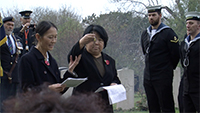
PLYMOUTH – ARRIVAL IN BRITAIN
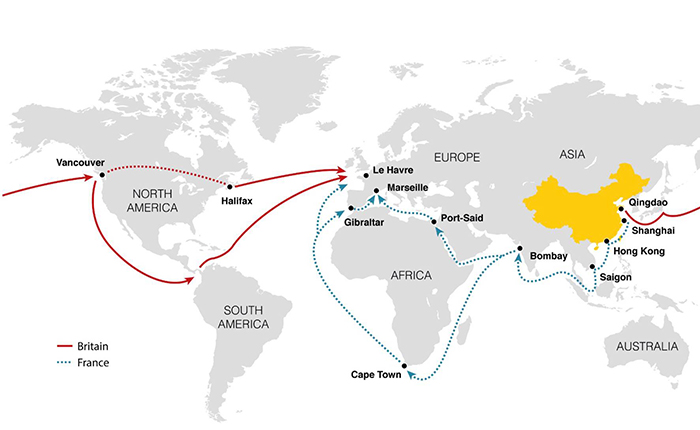
The quickest route from China to the Western Front was by sea via south-east Asia, around the southern coast of India, up the Red Sea and through the Suez Canal, across the Mediterranean and, from there, by land from Marseilles up to northern France. This course was taken by the French and would have been adopted by the British. However, when a German torpedo hit a French transport ship, the SS Athos, off the island of Malta, in which all 543 Chinese labourers on board were killed, the British ships were diverted via the Straits of Gibraltar, or up to Plymouth and Devonport, from where the labourers would travel by train to Dover or Folkestone and then by ship to France.
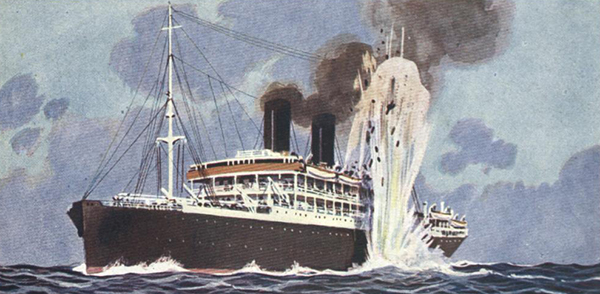
SS Athos, bombed by a German U-boat in February 1917.
The entire journey would take two to three months, a gruelling experience for the Chinese, for whom the rough seas would prove to be a terrible ordeal. Moreover, they travelled not on passenger ships, but in transport vessels, meaning that the men had to live in cramped conditions in the ships’ holds - a situation that would sometimes lead to conflict on board and disciplinary action being taken. According to the official log of the Teucer, some of the labourers had been put in irons as a result of inciting to mutiny. The Teucer was, in fact, the first ship to carry British recruits; having set out from Weihaiwei in Shandong Province on 18th January 1917, after a voyage of 84 days, it finally arrived in Plymouth on 11th April with a human cargo of 1086 Chinese labourers.
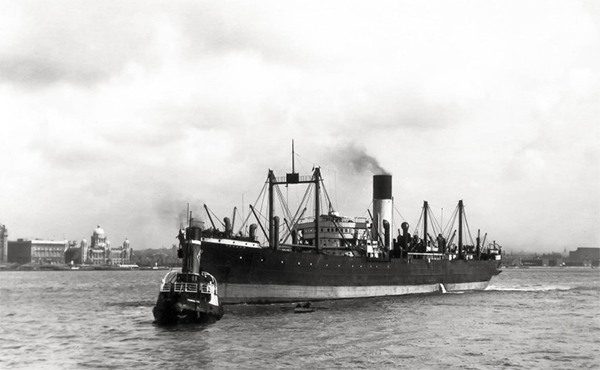
The Teucer, which carried the first CLC contingent.
During WWI, Plymouth, together with the neighbouring town of Devonport, was a base for the Royal Navy, the Army and the Royal Marines. It was from here that the armed forces were deployed to different parts of Europe or further afield. No records have yet been found of Chinese labourers staying on land in the area; it is conceivable that the men remained on board their ships right up until they were transferred onto trains bound for the South East.
Sadly, many of the labourers succumbed to disease or illness during the journey over or shortly after landing. Beri-beri was a common affliction caused by thiamine deficiency often brought about by excess consumption of white rice. The British Army had picked up supplies of rice from Hong Kong, not realizing that the labourers from Shandong Province (from where the large majority came) would not have been used to polished rice, having been brought up on wheat all their lives.
Edward Wills, a medical officer on the Teucer, on discovering forty-six cases of beri-beri on board, described some years later how the “white rice was changed for red coolie rice” at Colombo and was supplemented by lentils and legumes:
(British Medical Journal, June 1920)
Dysentery, gastritis and tuberculosis were other common causes of death. Of those who died on arrival in Britain, eight were buried in Efford Military Cemetery in Plymouth. According to a local newspaper:
“… three coffins were placed on a motor ambulance in the yard of the hospital in view of all the Chinese patients able to be present, who were lined up, together with the British patients. The Reverend Fisher (chaplain to the hospital) read an appropriate lesson and a short burial service, after which the Chinese interpreter spoke to the Chinese, whereupon they all uncovered their heads and bowed several times.”
(Western Morning News, 6th July 1917)
The hospital referred to was the Ford House Military Hospital.
CLC members buried at Efford Military Cemetery
CLC no. 11094 Wu Jinsheng (Wu Shieng Sheng), d. 28th June 1917 of dysentery
CLC no. 20012 Wang Fengzhu (Wang Feng Chu), d. 29th June 1917 of gastritis
CLC no.10216 Zhang Enqing (Chen Chu Chieng), d. 30th June 1917 of beri-beri
CLC no. 21470 Wang Peisheng (Wang Pu Sheng) from North China, aged 45, d. 2nd July 1917 of gastritis
CLC no. 11084 Wang Defu (Wang Te Fu), d. 4th July 1917 of beri-beri
CLC no. 11078 Song Jinglong (Sung Ching Lung), d. 6th July 1917 of beri-beri
CLC no. 25489 Yang Meilin (Yang Wulin) from North China, aged 30, d. 3rd August 1917 of pneumonia
CLC no. 25693 Sun Yuchen (Shun Yu Tsai), aged 30, d. 22nd August 1917 of cerebro-spinal fever
(Names are spelt according to the pinyin system used in China today; those in brackets are as they appear on the headstones, but many of these may have been recorded wrongly.)
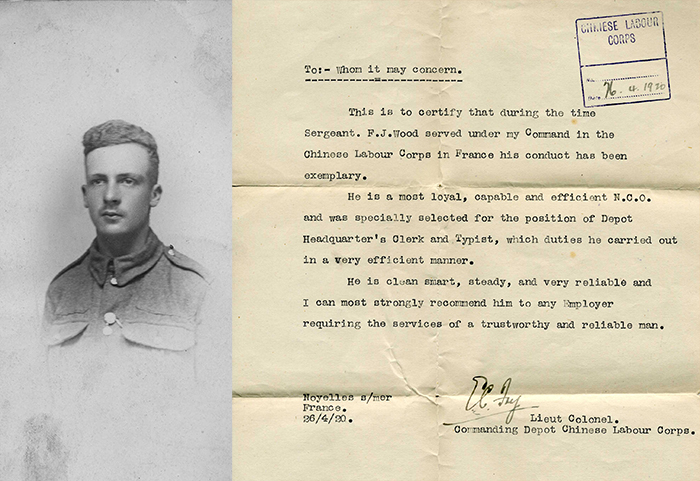
CLC transport ships arriving in south-west England
| Ship | Route | Departure date | Arrival date | British port | Chinese labourers on board |
| Teucer | Weihaiwei Singapore Maldives Cape Town |
18.01.1917 | 11.04.1917 | Plymouth | 1086 |
| Phemius | Hong Kong | 20.02.1917 | 25.04.1917 | Devonport | 1184 |
| Antilochus | Weihaiwei | 07.03.1917 | 07.06.1917 | Devonport | 1104 |
| Agapenor | Tsingtao | 04.04.1917 | 25.06.1917 | Devonport | 1861 |
| Helenus | Weihaiwei | 09.04.1917 | 25.06.1917 | Devonport | 1950 |
| Demodocus | Tsingtao Hong Kong Singapore Colombo Cape Town |
01.05.1917 | 27.07.1917 | Devonport | 1950 |
| TOTAL 8885 |
Commemoration Service on 5th November 2018 at Efford Military Cemetery
A service commemorating the eight Chinese labourers buried at Efford Military Cemetery was held on 5th November 2018 by The Meridian Society in collaboration with Plymouth Museums Galleries & Archives, Devonport Naval Heritage Centre and the Commonwealth War Graves Commission.

Drummers from the Royal Navy Volunteers’ Band and standard-bearers from the Royal British Legion led a procession of wreath layers and bearers of traditional Chinese offerings, while members of the Royal Navy at Devonport brought up the rear.
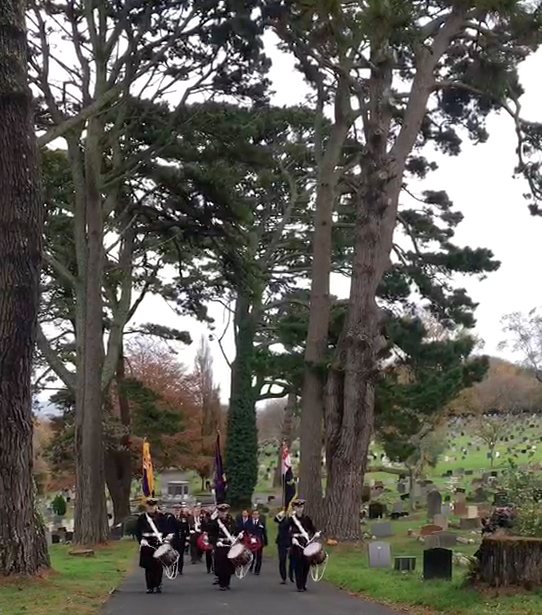
Mrs Cheng Ling and Mr Ma Jingdong, both grandchildren of labourers, who had come to Plymouth as part of an official delegation from Shandong Province, joined Mr David Wood and his sons, descendants of a British officer who had served with the CLC. Mrs Cheng and Mr Wood jointly laid a wreath spelling the letters “CLC”.

CLICK on the links below to read the speeches from the ceremony.
Speech by Cheng Ling, descendant of a Chinese labourer
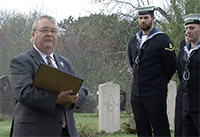
Speech by David Wood, descendant of a British officer assigned to the CLC

Photos courtesy of: David Wood, Stacey Turner, Peng Wenlan, Hi Ching


